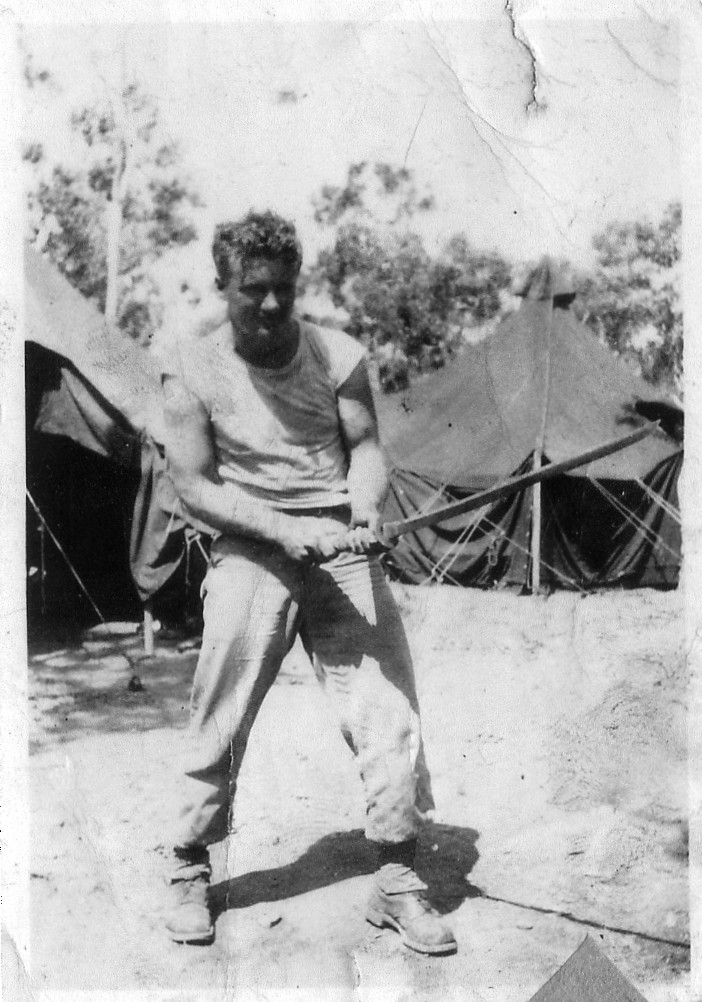In My Father's Scrapbook of War
In memoriam mei patris sine quo non
Harold J. Ladouceur (1922-2005)
An Eastern script,
Drawn in bleeding ink,
On the back
Of a tattered sepia photograph,
Arrayed in twelve serried columns,
Like marshalled warriors,
Jungle-stained,
 Lingers, as though waiting
Lingers, as though waiting
A decipherer,
An uncoder of its message,
As mysterious to me today
As when, a boy, I first scanned it,
In my father's scrapbook of war,
Fifty winters past.
Kanji, katakana, hiragana,
The characters' names I know.
Their meanings elude me.
And yet
In the years that have slipped by,
I learned the cuneiform of old Babylon,
The hieroglyphs of ancient Egypt,
Engraved on tombs and temples,
On castles of eternity.
Greek and Latin,
All Languages of the dead
These too I mastered.
Yet not one word of this script do I know,
This script not dead, but from one long dead,
Perhaps for fear
Over some old pain,
Deep seated,
That this calligraphy masks.
From that photograph,
From tones time-leveled,
Issues a small child,
Naked and uncircumcised,
On a blanket of swirling designs,
Of curious and intricate shapes,
Like the artful tsuba on a katana,
Those metal hilts on Samurai swords,
Family crests, mutely signing unbroken lineage,
Relics of the Muromachi period.
From that photograph
Issue a mother, kimono-clad,
Black-tinted glasses
Shielding her torment,
With two children
Caught in some perplexity,
Seemingly and forever,
"Why?"
Writ large on their faces,
And a bemedaled soldier
In honorable service to the Emperor Hirohito,
The Living God,
With his Nambu light machine gun,
Standing proud behind them.
And though
In my waking hours
Not one iota
Of that Eastern script
Can I construe,
Many a night
In my dreams
I read it flawlessly
Without hesitation or pause,
Like some long-rehearsed sectary of Shinto.
And its cadence is ghostlike,
The utterance of a skeletal presence,
Disjointed out of its time and place.
"If you read these words, six decades hence,
You are the son of the man who killed me,
Strangled me one night
In the kunai grass,
When the moon rose like a ripe melon,
Over the Papuan tail of New Guinea.
Would you have wanted to see,
With my eyes,
Your father's face that night
When he throttled me
There in the grass,
Seeing the way his smooth boyish look
Creased with lines of murderous effort,
Kabuki-like,
Wore that smile that a corpse assumes
When the stiffness of death comes?
And yet, it was I who was dying, not he.
But some part of the boy died there too,
Slayer turning to slain,
All in that single smile of death,
Risus mortis in your dead Latin.
Know this,
That your father wore a mask
Not over his face,
Like most men,
But under.
As the years sunk ever deeper into his face,
So too did that mask.
Would you have wanted to see
How his Warface
Rose over mine that night,
Ascended like some second fatal moon
Of Mars,
All catlike
Yearning to rob me of my breath?
Would you have wanted to feel his warm hands,
That always guided and caressed you,
Shattering the bone in my neck,
That bone shaped like a dead letter
In your precious Greek alphabet,
His warm hands guiding me to my death,
There in the jungle's drone?
And the creatures of the air,
Long before their appointed hour,
Long before the sun arose,
Cried out with me.
We were scouts,
He and I,
And even in the jungle's stench
Our trained senses,
Heightened by so much death-dealing,
Smelled each other.
In the jungle night,
In the greens without number,
Butter-man met Fish-oil-man
In the endless moment of combat,
And Butter-man killed Fish-oil-man,
Without quarter,
In a dark marsh,
Where leeches gorged heartily on our blood,
As we grappled,
Locked together in mortal struggle.
Know that birds wing their way in New Guinea
In whose bodies lurk poisons.
And once, famished, I ate their meat,
And my lips burned.
But a comrade taught me
To rub their flesh with charcoal
And draw out the searing toxins.
If only those leeches could have drawn
The poison out from our bodies,
The Venom of Hate
That so long sustained us
Like some fatal nourishment.
But I tell you this,
There is no malice here,
After life, past death.
If I could, I would have
Thrust your father through with my tanto knife
In one chance instant,
And then my three sons,
These sixty winters hence,
Would be wondering if the blond Western boy
With his strange two-toned suit,
And nickeled toy pistol,
In a photo they clasp,
Still thought of his long dead father
Somewhere in the boundless Pacific,
And whether the anguish
Of never knowing the place
Where his father passed
All alone,
Save for his killer,
Still, after all these years,
Cuts his heart.
But there is no hatred now.
Your father has joined me here,
Where all who were and have been,
Are void of poison.
And sometimes we sit together,
Butter-man and Fish-oil-man,
Beside an endless shimmering sea,
And speak of many things,
But never of the night
Two moons rose like ripe melons
Over the Papuan tail of New Guinea,
And the jungle birds screeched out
Long,
Long before their appointed hour."
by David J. Ladouceur
... who is a teacher and historian, and has previously published
creative writing in this magazine, as well as non-fiction in
professional journals. He is currently working on a novel,
After the War, set in the early 1950's which deals with a
veteran who returns from the conflict and shares not only his
stories but his ghosts with his son. Born into a military family,
Dr Ladouceur is the son of a jungle scout who served in the
Pacific Theater from Pearl Harbor through the end of World War
Two.
|
|